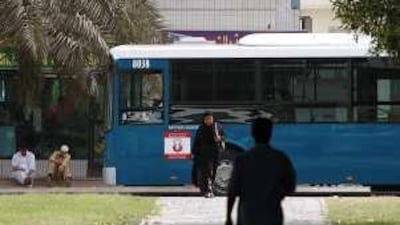ABU DHABI // The free ride on the capital's new buses is nearly at an end. But passengers will still be able to catch a ride on the fleet for one dirham, officials said yesterday. The Abu Dhabi Department of Transport's bus office yesterday unveiled the new fee structure for the buses, which goes into effect on Sunday. Officials said they set the fare low to encourage drivers to leave their cars at home and ease congestion on the city's crowded streets. Passengers will also be able to purchase bus passes - which the office has dubbed Ojra passes - for Dh3 (US$0.82) for a day, or Dh40 for a month. People over 60 or with special needs can continue to ride for free. Ojra means fare in Arabic. "We believe that the cost of Ojra passes and bus tickets are reasonable and provide best value for money," said Saeed al Hameli, general manager the bus office. "Ojra will help passengers save car fuel and maintenance costs and provides an attractive alternative to driving and the need to find parking. Finally, using public transport will reduce congestion on roads thus lowering pollution levels and creating a cleaner, greener healthier environment." He added that fares would also be reduced - or in some cases even scrapped - for pupils. Buses have been free since they hit city streets in June as part of an effort to encourage people to give them a try. "We want to try and change people's mentality and get them onto buses," said Mr al Hameli. Transport officials estimate around 50,000 people already use the 120 buses that operate on nine routes around Abu Dhabi Island. The plan is to have 860 buses running by the end of the year and 1,360 by the end of 2010. Tickets and passes will be available from 22 Ojra kiosks, including at Marina Mall, Khalidiya Police Station and the Central Bank, as well as the city's five bus stations. The monthly passes are the size of credit cards, and are not transferable. Passengers will also eventually be able to top up their passes online. Officials are hoping most passengers use the passes, rather than paying drivers for each trip, to speed up the loading process. Passengers had mixed reactions to the new scheme. Norvai Reyas, 35, a Filipino working in the construction sector, said the system was fair. "I use the buses but sometimes I have to wait a long time for them to arrive, so I have to use a taxi. The taxis are very expensive." But Romy Iraula, 38, a coffee shop bar manager from Manila, noted that if pass-holders did not use buses every day, they could lose money. "At home people can buy 10 tokens and if you don't use them all within a week, you can use them the next week. They carry over." Hossam Thabit, 23, a chef from the Palestinian territories who uses the network regularly, said more buses should be put on the road before the Government started charging people to use them. "I like the buses a lot but they are always very overcrowded. People are pushing you." The Government is planning to build an integrated public transport network across the emirate that will eventually link up trains, trams and a metro, and is compiling a transport master plan expected to be released at the end of March. The Government also plans to build more than 700 bus shelters, many of them air-conditioned. The first 170 shelters are expected to open this summer. Bus travellers can dial a free phone number, 800 55555, for further details about routes and services or log on to www.ojra.ae for more information. chamilton@thenational.ae

Abu Dhabi announces new bus fares
Monthly, daily and per ride payment schemes initiate strategy to develop integrated transport network throughout emirate.
Most popular today
